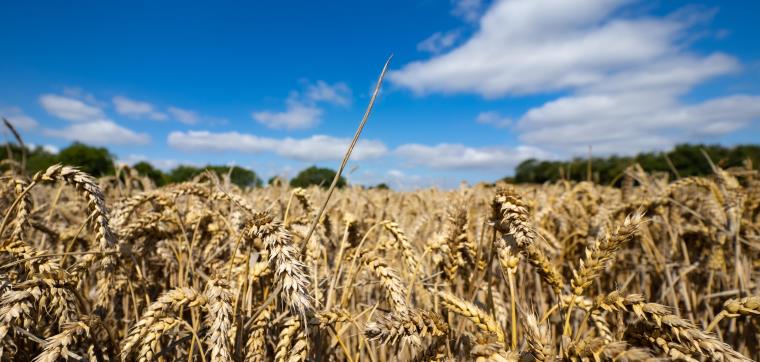Research network co-led by UWE Bristol academic to help agri-food industry reach net zero

A network of researchers, co-led by a food systems expert from UWE Bristol, is set to help the UK’s agri-food industry move one step closer to net zero.
Funded to the tune of £5 million, the network will bring UK researchers together to explore effective ways to support the industry to reduce its greenhouse gas emissions and improve its environmental sustainability.
It will also help the UK’s agri-food industry enhance biodiversity, maintain healthy ecosystems, nurture livelihoods, support healthy consumer habits, and minimise the environmental impacts of overseas trade.
The network will be led by a team of four researchers: UWE Bristol’s Dr Angelina Sanderson Bellamy, Associate Professor of Food Systems; Professor Tim Benton of the University of Leeds; Professor Sarah Bridle of the University of York; and Professor Neil Ward of the University of East Anglia. But it will bring together researchers, industry leaders, government and members of the public.
According to the latest research, the UK’s agri-food industry is responsible for almost a quarter of the country’s greenhouse gas emissions. Given this significant contribution, it is one industry in which greenhouse gas emissions needs to be addressed if the country is to meet its net zero goals by 2050. However, although the industry contributes to and is affected by climate change, it can also be part of the solution.
The agri-food industry is more than farming alone and involves the whole journey from the farm to the plate and beyond, including manufacturing, retail, consumption and waste management. Any efforts to reduce the industry’s greenhouse gas emissions therefore needs expertise from across a range of research disciplines. The agricultural, biological, natural, environmental, physical, engineering, economic and social sciences all have a role to play.
Led by the Engineering and Physical Sciences Research Council, UK Research and Innovation and four of its research councils below have joined forces to provide the funding for the network.
- Biotechnology and Biological Sciences Research Council (BBSRC)
- Economic and Social Research Council (ESRC)
- Engineering and Physical Sciences Research Council (EPSRC)
- Natural Environment Research Council (NERC).
Dr Angelina Sanderson Bellamy said:
“This is a hugely important and exciting initiative and we are thrilled to have the opportunity to build a network to move the agrifood system towards net zero. Climate change is increasingly recognised as the major threat for humanity. Extreme weather events, likely caused by climate change, are already decimating crop yields.
“The cost-of-living crisis caused by the pandemic is driving up food prices, leading people to prioritise cheap food over sustainable food. And the war in Ukraine is wreaking havoc in a major global breadbasket, risking famines and food protectionism globally.
“We need to convene action to secure healthy and sustainably produced food for all. The scale and urgency of the challenge means the old ways of establishing and settling upon research priorities will not do. It is vital that researchers and stakeholders come together in a spirit of openness and collaboration, and with real urgency, to mobilise ideas and resources around advancing the transition.
“We are really pleased to have been able to bring together such an extensive network team around a shared vision and plan of action. The 2020s is the decade of action. The three-year period of this project will be absolutely critical for the decade and jump-starting coordinated research and action.
“What will be the innovations we want to invest in and scale up? These are the challenges we will seek to address in the next three years, and we’re excited to work with stakeholders across the agrifood system to put us on a net zero pathway.”
Professor Dame Lynn Gladden, EPSRC Executive Chair, said:
“The agriculture food system produces nearly a quarter of the UK’s carbon emissions. By bringing together a multidisciplinary team and engaging a wide range of stakeholders, this project will explore how the journey from farm to fork could be made more sustainable, helping to meet the UK Government’s strategy for achieving net zero by 2050.”
The funding will run for three years, starting in July 2022.
Related news

10 February 2026
Work by UWE Bristol lecturer features in Government’s National Cancer Plan
Work by a UWE Bristol academic has been included in the Government’s National Cancer Plan.

23 January 2026
On-demand minibus services beneficial in rural areas but face financial challenges, trials suggest
Trials of ‘demand responsive transport’ minibus services boosted connectivity for people in rural and suburban areas, according to a new report produced by UWE Bristol researchers.

18 December 2025
UWE Bristol professor appointed National Institute for Health and Care Excellence CEO
Jonathan Benger CBE, Professor of Emergency Care at UWE Bristol, has been appointed as the new chief executive officer of the National Institute for Health and Care Excellence (NICE).

17 December 2025
Findings revealed from first UK study into experiences of mothers who are survivors of rape pregnancy
UWE Bristol academics have revealed the findings of the first UK-based study of the experiences of mothers who are survivors of rape pregnancy.

11 December 2025
Social media influencer work is far more demanding than it looks, research finds
A study exploring the mental health impacts of social media influencer work has revealed that life online is far more demanding than it appears.

25 November 2025
UWE Bristol experts join film Q&A exploring music and melodrama
Academics will take part in the Cary Comes Home Festival, with a post-screening Q&A exploring music, melodrama and emotional storytelling in classic cinema.

17 November 2025
Urgent reform needed to support ambulance-delivered end of life care, study finds
More than three quarters (78 per cent) of paramedics sometimes fear doing the wrong thing when caring for people in the last year of life, new research has found.

13 November 2025
Bristol’s screen industry experiences “boom-and-bust cycle” after post-pandemic recovery, new research from UWE Bristol finds
New research from UWE Bristol provides detailed insight into Bristol's screen sector.

13 November 2025
New AI research to revolutionise animal welfare
A UWE Bristol research project will combine behavioural science and AI to create technology that understands not only what animals do, but how they feel.

10 November 2025
Lessons from Low Traffic Neighbourhoods will drive better public engagement, study finds
Lessons from Low Traffic Neighbourhoods have informed a new toolkit to improve engagement with the public on challenging local street issues.

06 November 2025
First-of-its-kind study aims to help more people spend their final days at home
A new study will explore how architectural design could support end-of-life care in domestic settings.

29 October 2025
UWE Bristol academic unveils breakthrough in energy-efficient AI at NATO science forum
Dr Jonathan Lancelot has developed a new form of AI that could transform how intelligent machines operate in space, defence, and remote environments.






